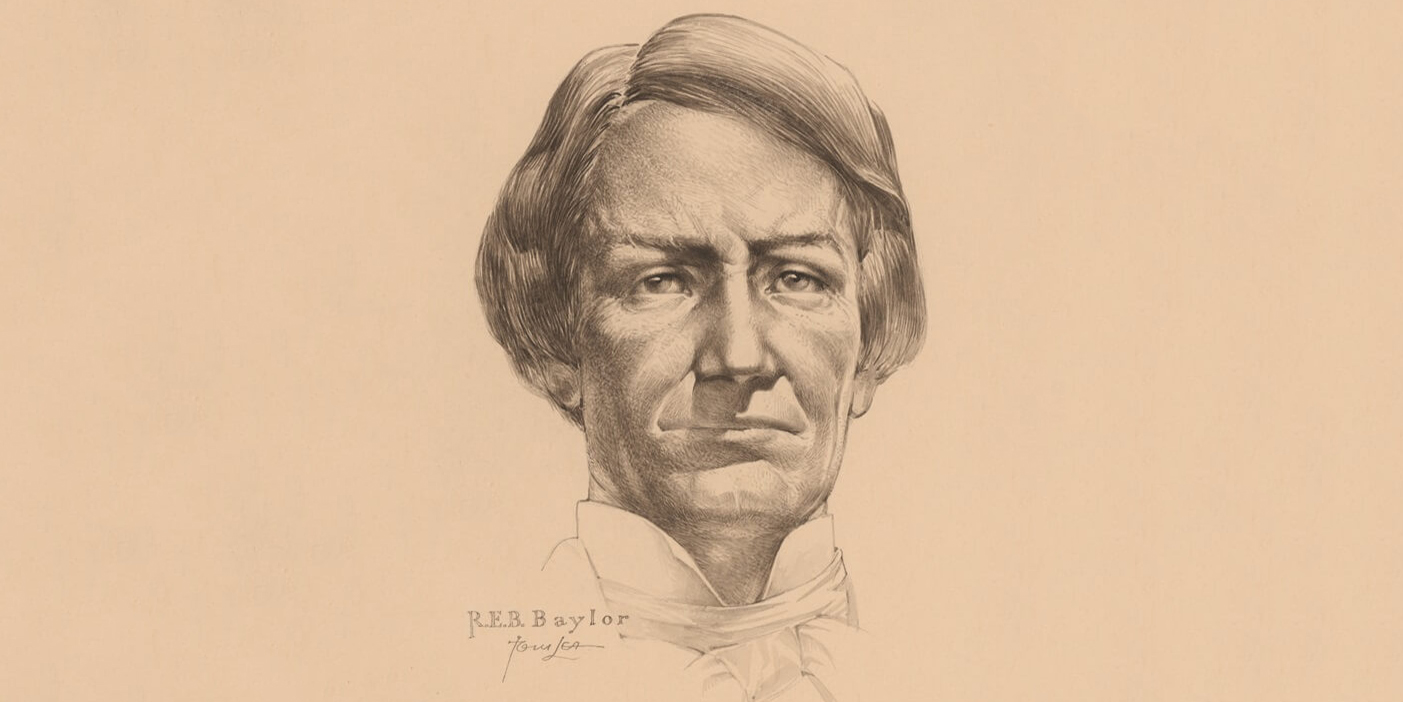Who was Judge Baylor?

Every Baylor student knows of Judge Baylor, even if only because of the statue on campus. But how much do you really know about the man for whom our university is named?
Robert Emmett Bledsoe Baylor — known most commonly as “Judge Baylor” here on campus — was born more than 200 years ago, on May 10, 1793 in Lincoln County, Ky. His father served with the Continental Army during the American Revolution (!!), and eventually served as an orderly on General George Washington’s staff. (R.E.B. Baylor himself served in the War of 1812.)
During his 20s, Baylor studied law with his uncle and became well-known throughout Kentucky. In 1819, he was elected to Kentucky State Legislature at the age of 26; later, he moved to Alabama and was elected to its legislature, as well.
But perhaps the most defining moment of R.E.B. Baylor’s life — one that eventually led to Baylor University’s founding as an unabashedly Christian institution — came in 1839 with his conversion to Christianity. You might remember learning about the Second Great Awakening in U.S. history classes, where Baptist and other Protestant revivals were held across the country. Baylor attended one of these revivals, and shortly after became an ordained Baptist minister.
At the age of 46, in the middle of a flourishing political career, Baylor packed up and went to the newly established Republic of Texas to spread the Gospel. He settled near La Grange in Fayette County, just southeast of the newly founded Austin, where he assisted in organizing the Union Baptist Association in 1840 and the Texas Baptist Education Society around 1841. While judging cases around the state, he presided over the first district court held in Waco and preached perhaps the first sermon offered in Waco.
Baylor was elected judge of the Third Judicial District of the Congress of the Republic of Texas — where he earned the title “Judge Baylor” — and became an associate justice of the Supreme Court, an office he held until the end of the Republic. Later, he was one of 57 delegates at the Convention of 1845, where he helped write Texas’ first state constitution after it was annexed into the United States.
But before he helped Texas become a state, Baylor helped establish Texas’s first Baptist university. He may have been the first to donate funds to get the school started — $1,000, the equivalent of more than $30,000 today — but he never wanted the school to be named for him. To Baylor, the establishment of this Baptist university was primarily thanks to the two other founders: William M. Tryon, who was the first to suggest that a Baptist university be established in Texas, and James Huckins, the first Baptist missionary to Texas and the university’s first full-time fundraiser. Judge Baylor insisted that the university be named after Tryon, saying his own “humble donation” didn’t deserve that kind of honor, but Tryon feared it would appear as though his push for the university had been self-serving all along. So, despite his coworker’s protest, Tryon immediately took the charter and wrote in the name “Baylor.”
For a time, R.E.B. Baylor taught law at the university, but (despite the common misconception) he was never president. Judge Baylor never married or had children. He died on Dec. 30, 1873, and was buried, as he had requested, on the campus of Baylor University at Independence. His remains were reinterred in 1917 on the campus of Baylor Female College (now the University of Mary Hardin-Baylor).
Looking back at Judge R.E.B. Baylor’s life, it’s clear to see how Baylor University became the school it is today — one with a great reputation for law, a call to give back to its community, and a dedication to the Christian faith. The “Baylor” legacy most certainly lives on in everyone who calls himself or herself a “Baylor Bear.”
Sic ’em, Judge Baylor!
You might also like:
* James Huckins: Missionary, church planter, and Baylor Founding Father (April, 2017)
* Meet Baylor’s first professor — a 30-year-old Episcopalian from Connecticut (Feb. 2017)
* Happy 170th birthday, Baylor University! (Jan. 2015)

